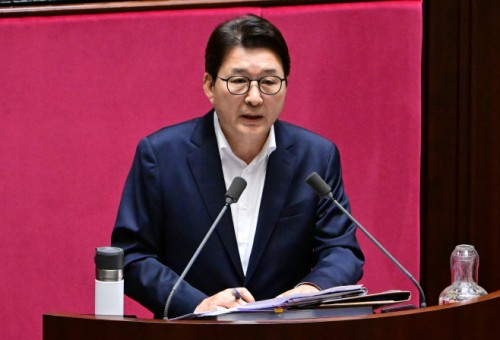 |
| Rep. Shin Dong-wook of the People Power Party engages in a filibuster on the proposed broadcast reform bills during a plenary session at the National Assembly in Seoul on August 4. / Photo by Lee Byung-hwa |
The ruling and opposition parties clashed on August 4 over contentious legislation as the Democratic Party (DP) moved to bring the so-called “Labor, Broadcast, and Commercial” bills—including the Broadcast Reform Bills, the Yellow Envelope Act, and amendments to the Commercial Act—to the National Assembly’s plenary session. The People Power Party (PPP) responded with an unlimited filibuster.
The Assembly passed a DP motion to change the agenda order, with 173 votes in favor and 92 against. Initially, the disputed bills—including the Broadcast Act, Commercial Act, and Labor Union Act—were scheduled among the first items, but both sides agreed to process 15 non-contentious bills first before addressing the disputed ones. PPP floor leader Song Eon-seok criticized the move, saying, “The DP did not even disclose until this morning which bill it would table first, be it the Commercial Act, the illegal strike-promoting act, or the broadcast control act.”
Under newly elected DP leader Jung Cheong-rae, the party has accelerated its reform agenda. Jung stated at a party meeting, “The broadcast reform bills will be the first to be presented and processed today.” DP floor leader Kim Byung-ki confirmed, “Under parliamentary rules, voting will begin once debate ends after 24 hours.”
The PPP, however, began a filibuster to block the bills. As of 4:03 p.m., 166 lawmakers, including DP Rep. Moon Jin-seok, submitted a motion to end the filibuster on the Broadcast Act amendment. According to parliamentary procedure, a vote could be held in the afternoon of August 5, after the 24-hour debate window closes.
The DP plans to leverage its majority to pass the bills sequentially, while the PPP has vowed to continue debate on each measure individually.
Most Read
-
1
-
2
-
3
-
4
-
5
-
6
-
7





















